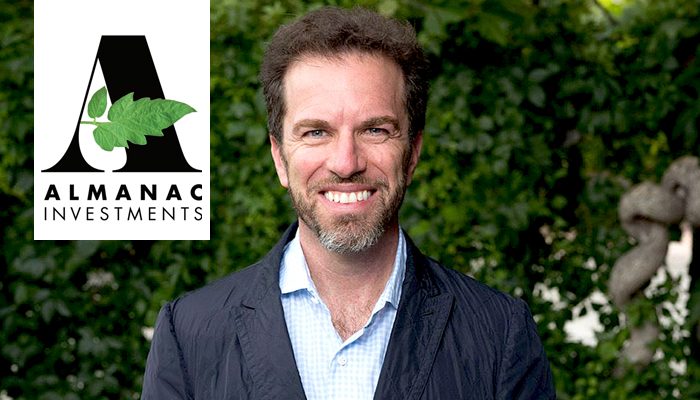Today, David Barber, co-owner of restaurants Blue Hill and Blue Hill at Stone Barns, announced the launch of Almanac Investments, a $30 million fund for agriculture and hospitality technology, CPG, and experiential retail companies. Typically, Almanac will invest in seed or series A rounds for early stage brands and has already closed three investments.
Joining Barber is Zoe Feldman, who will serve as managing director of the fund. Both Barber and Feldman have experience in the investment world. Barber, an angel investor himself, is an advisor to venture fund S2G Ventures and Acre Investments, whose sole limited partner is The Campbell’s Soup Company, while Feldman, a former PepsiCo executive, most recently was the managing director for Cleveland Avenue’s fund.
Almanac hopes to set itself apart from other funds by developing a deep pool of resources — in data, marketing, public relations, accounting, supply chain, operations and more — that not only will assist with vetting prospective investments but then can be hired by companies once they are part of the Almanac portfolio. Barber hopes that assembling this team will help create a more unified support system for the entrepreneur.
“I found it shocking that [service providers] don’t talk to each other that much about the companies that they are simultaneously working on. They are working adjacently but they aren’t actually collaborating. So our idea is to get them collaborating on our behalf,” Barber said. “It’s a huge value add to the entrepreneur.”
Too often, Feldman said, small brands have to choose between initiatives due to a lack of capital. For example, having to choose between buying data and hiring a bookkeeper, or designing sales strategy and finding a great communications firm. “What we’re doing is eliminating the barriers for them to both find and afford these resources,” Feldman added.
Although Almanac is not an impact investing or evergreen fund and will only invest in companies where they expect to see a return on investment, Barber does plan for these investments to take longer to come to fruition. As a result, Almanac plans to only invest in one to two companies per year and at any one time, and expects to have up to six brands in the portfolio that require more hands-on attention and operational support.
This “long tail” capital, Barber believes, will allow Almanac to have a deeper relationship with its portfolio companies and more time for its team of resources to assist brands.
“We want to help businesses build a strong foundation in this ecosystem,” Barber said. “We think those have both the best chance of surviving no matter what and I think they are the ones that are going to contribute the most in the long term.”
Barber told NOSH that the capital for the fund was raised from individual investors and although there were offers from strategics, he felt the goals of the fund were not conducive to the ways large strategics view deploying capital. All of the individuals invested in the fund, Barber said, are interested in building a “healthy food ecosystem” and next generation companies.
That doesn’t mean Barber doesn’t see a role for large strategics in the food ecosystem. To the contrary, he hopes some of his investments will later accept capital from these groups and will be better equipped to take a larger check because they have a better foundation from working with the Almanac pool of resources.
Barber has focused on building sustainably focused food businesses for decades. His family owns and operates Blue Hill, an award winning farm-to-table restaurant helmed by Barber’s brother, chef Dan Barber, and Blue Hill Farms. He also serves on the board of directors for the nonprofit Stone Barns Center for Agriculture. His own previous food business, a line of savory yogurts sold under the Blue Hill name, used grass-fed milk and small farmer grown vegetable purees. Feldman also has a background, and masters, in public health.
Although Almanac will lean towards investments that are in the sustainability space, this direction is not just because of his own background, Barber noted, adding “I fervently believe that the long term value and best returns and best opportunities that positively affect the food system all lie in elements and principles of sustainability and regenerative agriculture.”
Feldman explained further that investments must be “good stewards” not only of the land but also in terms of business practices. She maintained that while the fund is pragmatic about how it invests, the concepts of “scalable” and “sustainable” don’t have to be independent of each other.
The announcement of the fund comes alongside the disclosure that Almanac has already taken part in investment rounds with Nona Lim, a line of Asian-inspired soups, broths and noodles, Pilotworks, an operator of culinary incubators across the United States, and BlueCart, a wholesale order management platform for buyers and sellers in the hospitality industry.
Barber compared PilotWorks, which recently closed a $13 million round of investment, to an“Apple store” for coworking spaces and shared kitchens. The bright, plug-and-play spaces are located around the country and also could serve as a source for future Almanac deals, according to the team.

